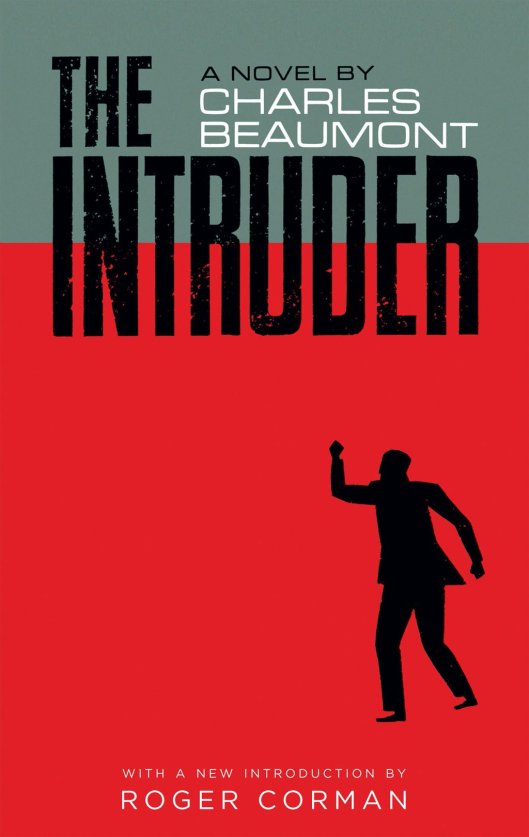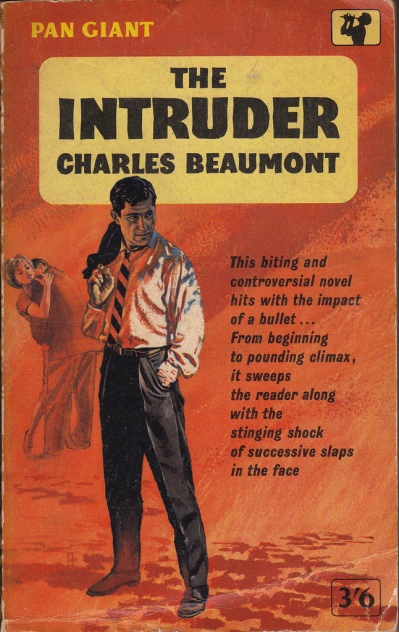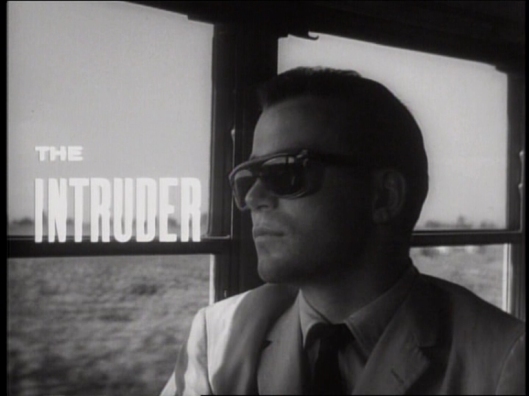Tags
1950s, 1959, Centipede Press, Charles Beaumont, Deep South/Jim Crow, history, race relations, suspense, thriller, Valancourt Books
Charles Beaumont is one of many “great authors you’ve probably never heard of” who deserves more publicity than he got. He wrote a large and excellent body of short stories, penned 22 episodes of The Twilight Zone, wrote screenplays for science fiction films, even a couple of novels. Had he lived longer, he may have been remembered alongside contemporaries Ray Bradbury and Richard Matheson as a master of horror, science fiction, and suspense. Alas, Beaumont passed away at the age of 38 of an undiagnosed brain illness, now thought to be either Pick’s disease or early-onset Alzheimer’s. There has been a recent resurgence in his work, with Penguin Classics collecting some of his short stories as Perchance to Dream, and Valancourt Books re-releasing collections A Touch of the Creature and The Hunger and Other Stories along with his compelling novel The Intruder.
Caxton is one of many sleepy small Southern towns; not much happens here to rock the boat, and not much has changed over the decades. Except for integration, with the high school set to desegregate by court order next week. That’s when Adam Cramer steps off the bus into the sunny streets of Caxton, a smooth-talker from California. His past is mysterious. His motives are not: within hours, he’s begun to organize the town charter of SNAP (the Society of National American Patriots). Their mission is to stall or end integration—by any means necessary. Adam Cramer has lit a match under a powder-keg of racial tensions, and as the violence escalates he may not be able to keep control.
But who is Cramer? What is his sinister agenda? Those driving questions lead to an explosive conclusion. A token few stand against him: black high schooler Joey just trying to graduate high school without any trouble, and town newspaperman Tom who’s repelled by Cramer and comes to realize he can’t justify his hate. In fact, very few in town can justify their bigotry, standing against integration because “Well, it’s wrong,” blind recitations of prejudice ingrained in their minds. But as Cramer instigates the Klan to action, the town may be swept up in a mob mentality…
A white man riding into town, rising to a position of power using populism, jingoism, and patriotism to inflame racial tensions—hrrm, where have I heard that one recently? It’s too easy for white Americans (especially outside of the South) to think of racism and Jim Crow as days long gone, before our time and out of our control. It’s somewhat shocking to realize that Ruby Bridges is only in her sixties, that Emmett Till’s murder and the Bus Boycott were just over a half-century ago. Beaumont provides a visceral depiction of the racism underlying Southern society at the time—more to the point, he offers multiple views from the townsfolk, showing how pervasive and ingrained bigotry can be. These range from otherwise decent people like Tom who find themselves fighting integration by habit without question, to those who justify it with intellectual arguments, to extremists so revolted by integration that they are willing to spill blood.
Beaumont has opted for slow, deliberate plotting here, and I found some sections drew on too long focusing on one character or another’s internalized voice. But tension roils and slithers underneath with electric intensity, and there are some shocking moments of greatness—if not true suspense or thrills, then the chilling power of prejudice. The Intruder has all the subtlety of a tank—Cramer gets the townsfolk riled up with fears of black boys sitting next to their daughters at school, right before he starts necking with one such daughter, a sixteen-year-old girl. (This is one of several sleazy elements that remind me of its origin as a paperback thriller.) But there’s a certain power of persuasion at work here. The way the novel is written from the perspectives of various townsfolk, black and white, offers a collection of complex and human views that help ground the novel. Between that and Cramer’s nefarious true motive, The Intruder surpassed my expectations.
The Intruder has its tacky, sleazy elements and odd pacing elements that slow it down, but it does so many things right that it’s hard not to recommend it. As a portrait of race relations in the late ’50s, early ’60s, it veers back and forth between realism and hyperbole, but the book has an arresting power that grabbed my interest. It may be better at capturing the mentality of the era rather than any realistic events, but it evokes a vision of the South that’s downright chilling today. The Intruder ended up being a more complex and thoughtful novel than I anticipated. It’s a great read, and something of an underrated, forgotten gem.
Motion Pictures Dept: The Intruder was directed by guerrilla filmmaker and B-movie king Roger Corman in 1962, and was the first (and I believe only) film he made to lose money. In fact, it was re-released as Shame and I Hate Your Guts!, re-branded as exploitation films, trying to turn a profit that never came. It’s a shame, because the film is very good, a stark and vivid portrayal of racism that stays very close to the novel. What was cut are elements that reveal too much of Cramer’s background and intent, leaving his motives in the film more mysterious and menacing than in the novel.
The film stars a young William Shatner in his first leading film role as villain Adam Cramer, and he hams it up well as the nefarious instigator. Given Corman’s typical shoestring budget, Beaumont himself plays the high school principal, and his friends and fellow writers William F. Nolan and George Clayton Johnson play redneck thugs. Corman and crew assumed that Missouri was far enough “North” to shoot the film, but integration was still a heated topic, and tensions ran high between filmmakers and the locals. The cast and crew were run out of several towns by local law enforcement, and ended up filming from town to town, packing up and fleeing back to their hotel as soon as a shot was complete.
The Intruder is a bit rough around the edges, so raw and full of energy that it’s engrossing in its bluntness. It’s very much worth watching, especially if you’re a Corman fan. In fact, I’d call it one of his best if not the best he made, though I am biased towards Death Race 2000 and his Vincent Price/Poe films.
Book Details
Title: The Intruder
Author: Charles Beaumont
First Published: 1959
What I Read: Centipede Press hc, 2013
Price I Paid: $20 (sale)
MSRP: $16.99 pb / $4.99 ebook
ISBN/ASIN: 1941147852 / B00ZGSIM9M




Lissen, kiddo. Us boring old farts remember Charles Beaumont (and for that matter William F. Nolan) very well indeed. They were both of them extremely good and extraordinary smooth-reading writers. You mention Matheson as their peer, and at the time I’d have been hard-pressed to choose among them: they were just all three of them so fine in their slightly different ways.
As for the movie, you’re right about that, too. Arguably Corman’s finest hour; likewise Shatner’s. The piece did badly at the time, I think, because of the reluctance of too many white Americans to confront the truth about themselves. Plus ca change.
LikeLiked by 2 people
To be fair, it’s not the old farts (who are rarely boring!) who I’m worried are missing out on Beaumont. Matheson is close to a household name for fans, yet Beaumont, more or less his equal, gets short shrift. Speaking of William F. Nolan, I just bought his collection LIKE A DEAD MAN WALKING, published in 2013… He also deserves a lot more recognition for his work. Agree with your point on the film; it was probably too much of a hot-button issue that audiences didn’t want to deal with. Plus ca change indeed…
LikeLike
Great review Chris – have only ever seen the film but I have read a lot of his shorter fiction and really glad to hear it has been reprinted.
LikeLiked by 1 person
I think he did most of his best work on short fiction, but this one was rather good and I’d like to read more of his (admittedly few) novels.
LikeLike
The nicest collection I have of his was an anthology edited by Roger Anker entitled THE HOWLING MAN which included several biographical pieces from friends: https://www.amazon.co.uk/Howling-Man-Charles-Beaumont/dp/0812505522
LikeLike
It’s good to hear there’s a resurgence of interest in Beaumont’s work, I’ve always enjoyed finding his short stories in anthologies. I’ve not read either of his novels though and you’ve inspired me to find that wonderful Pan edition. Thanks for the interesting article.
LikeLiked by 1 person
Thanks! I’ve always liked his work, so I’m glad so much of it is available again… It wasn’t that long ago that novels like this one were relativity hard to find. Hope you can find a good copy of the Pan at a good price.
LikeLiked by 1 person
I read his short story “The Vanishing American” a very long time ago,in an SF hardcover anthology published in Great Britain by the Chacellor Press.I don’t remember much about it,but I’ve just gone back and flipped through it,and have a little idea.
LikeLiked by 1 person
That is one of his stories I have not yet read, so unfortunately I cannot comment. The ones that stick out in my mind are “Beautiful People,” “Traumerei,” “The Jungle”… I’ve you’ve enjoyed similar Twilight Zone-type stories, he’s very much worth seeking out.
LikeLike
Yes,the actual collection it’s in,is called “Great Tales of Science Fiction and Fantasy”,all of which were originally published in “The Magazine of Fantasy and Science Fiction”
LikeLiked by 1 person
Oh, I think I have that one!
LikeLike
You must have read it then! Do you have the British edition? I looked it up earlier on Google.Apparently Ed Fermen edited the American one.
LikeLiked by 1 person
Semi-echoing John C Nash’s statement, I’m going to start to look for some of his stories in collections — for example Yonder: Stories of Fantasy and Science Fiction (1958) or The Magic Man and Other Science-Fantasy Stories (1965).
….on the amazon wish list they go.
Thanks for the review.
LikeLiked by 1 person
I know you found Matheson’s THIRD FROM THE SUN hit or miss, and YONDER was very similar to it from what I recall… Still give it a try. I liked em both, bought them at the same time. Before I was blogging, alas, and my memory is sketchy.
LikeLike
Always looked forward ti his Twilight Zone scripts.
LikeLike
I have read thoroughly all the comments about TZ and encourage readers to find Sands of Time a collection of thought provoking stories.
By Beatrice C Snipp.
So much like early TZ stories.
LikeLike
If you get a chance to read, Sands of Time a collection of thought provoking stories.
By Beatrice C Snipp. Read it, very reminiscent of Charles Beaumont.
Also very good in its own right.
Stay safe and keep reading
LikeLike